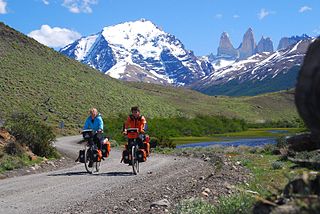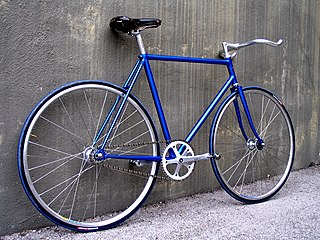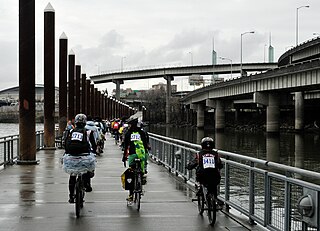Related Research Articles

A bicycle, also called a pedal cycle, bike, push-bike or cycle, is a human-powered or motor-assisted, pedal-driven, single-track vehicle, with two wheels attached to a frame, one behind the other. A bicycle rider is called a cyclist, or bicyclist.

Cycling, also known as bicycling or biking, is the activity of riding a bicycle or other type of cycle. It encompasses the use of human-powered vehicles such as balance bikes, unicycles, tricycles, and quadricycles. Cycling is practised around the world for purposes including transport, recreation, exercise, and competitive sport.

A tricycle, sometimes abbreviated to trike, is a human-powered three-wheeled vehicle.

Bicycle touring is the taking of self-contained cycling trips for pleasure, adventure or autonomy rather than sport, commuting or exercise. Bicycle touring can range from single-day trips to extended travels spanning weeks or months. Tours may be planned by the participant or organized by a tourism business, local club or organization, or a charity as a fund-raising venture.

A fixed-gear bicycle is a bicycle that has a drivetrain with no freewheel mechanism such that the pedals always will spin together with the rear wheel. The freewheel was developed early in the history of bicycle design but the fixed-gear bicycle remained the standard track racing design. More recently the "fixie" has become a popular alternative among mainly urban cyclists, offering the advantage of simplicity compared with the standard multi-geared bicycle.

Bicycle Network is an Australian charity, one of the largest cycling membership organisations in the world, whose mission is to have More People Cycling More Often. Before 2011 it was known as Bicycle Victoria.

Training wheels, known as stabilizers outside North America, are a set of additional wheels attached to the rear wheel of a bicycle, effectively turning it into a tricycle as beginners learn to ride independently. Since the late 1990s, balance bikes have gradually replaced training wheels as a more effective tool for developing a sense of balance.

Bicycle safety is the use of road traffic safety practices to reduce risk associated with cycling. Risk can be defined as the number of incidents occurring for a given amount of cycling. Some of this subject matter is hotly debated: for example, which types of cycling environment or cycling infrastructure is safest for cyclists. The merits of obeying the traffic laws and using bicycle lighting at night are less controversial. Wearing a bicycle helmet may reduce the chance of head injury in the event of a crash.

An electric bicycle, e-bike, electrically assisted pedal cycles, or electrically power assisted cycles is a motorized bicycle with an integrated electric motor used to assist propulsion. Many kinds of e-bikes are available worldwide, but they generally fall into two broad categories: bikes that assist the rider's pedal-power and bikes that add a throttle, integrating moped-style functionality. Both retain the ability to be pedaled by the rider and are therefore not electric motorcycles. E-bikes use rechargeable batteries and typically are motor-powered up to 25 to 32 km/h. High-powered varieties can often travel more than 45 km/h (28 mph).
Many countries have enacted electric vehicle laws to regulate the use of electric bicycles, also termed e-bikes. Some jurisdictions have regulations governing safety requirements and standards of manufacture. The members of the European Union and other regions have wider-ranging legislation covering use and safety.

A bicycle boulevard, sometimes referred to as a neighborhood greenway, neighborway, neighborhood bikeway or neighborhood byway is a type of bikeway composed of a low-speed street which has been "optimized" for bicycle traffic. Bicycle boulevards discourage cut-through motor-vehicle traffic but may allow local motor-vehicle traffic at low speeds. They are designed to give priority to bicyclists as through-going traffic. They are intended as a low-cost, politically popular way to create a connected network of streets with good bicyclist comfort and/or safety.
Jan Vander Tuin is a founder of the Community Supported Agriculture (CSA) movement. He is also a cycling activist and bicycle designer, and in 1992 started the Center for Appropriate Transport in Eugene, Oregon.

The International Mountain Bicycling Association (IMBA) is a non-profit educational association that aims to create and preserve trails for mountain bikers worldwide. The IMBA promotes mountain biking, trail building, and trail maintenance. The IMBA has developed a set of principles known as the "Rules of the Trail", which promote responsibility on shared-use and single track trails.

Bicycle parking is part of the cycling infrastructure of a populated place allowing for the storage of bicycles when they are not being used. Parking facilities for bicycles include racks, lockers, parking stations, and covered areas. Bicycle parking infrastructure, in addition to cyclists' equipment such bicycle locks, offers a degree of security and may prevent bicycle theft. Ad hoc bicycle parking alongside railings, signs, and other street furniture is a common practice and may be recognized through formal legal arrangements.

A balance bike is a bicycle without pedals that learners propel by pushing their feet against the ground. By allowing children to focus on developing their sense of balance and coordination before introducing pedalling, balance bikes enable independent riding more quickly than training wheels.

The Street Trust is a 501(c)(3) non-profit advocacy organization based in Portland, Oregon, United States. The Street Trust advocates for the safety and ease of biking, walking and riding public transit in communities. The organization does legislative work at the statewide and national levels and endorses legislation and ballot measures. It successfully lobbied Portland's mass transit company, TriMet, to accommodate bicycles on buses and prevailed in a lawsuit to uphold Oregon's Bicycle Bill.

The following outline is provided as an overview of and topical guide to bicycles:

Pedaling Revolution: How Cyclists Are Changing American Cities is a non-fiction book written by Jeff Mapes, a political reporter for The Oregonian. The book gives a brief history of the bicycle from its start in the early 1800s, when it could only be afforded by the wealthy, through to the present. He talks of the 1890s when bicycles were inexpensive enough for commoners to afford, yet automobiles had yet to be mass produced, and city streets were filled with bikes leading the League of American Wheelmen to lobby for paved roads. The end of World War II saw a decline in the bicycle as automobiles became more a way of life. The 1970s saw a boom in the American bicycle market, to again decline in the 1980s. Most recently, Mapes looked at several then-current politicians who were outspoken about bicycle advocacy such as then-chairman Jim Oberstar (D-MN) of the United States House Committee on Transportation and Infrastructure who Mapes calls the highest regarded cycling supporter in Congress. Later chapters look at cycling in cities such as Amsterdam, Davis, California, Portland, Oregon, and New York City. The final chapters detail some of the risks and rewards of bicycling.

The Worst Day of the Year Ride is the annual cycling event held in Portland, Oregon, in the United States.
References
- ↑ Clynes, Tom (September 7, 2011). "Why Cargo Bikes Are Cycling's Coolest Inventions". Bicycling . Retrieved January 2, 2016.
- ↑ Maus, Jonathan (August 7, 2009). "Oregon Cycling Magazine Shuts Down; New Owners Look to Bring it Back". Bike Portland.
- 1 2 Nagata, Yoshiyuki (2006). Center for Appropriate Transport. Springer Verlag. p. 78. ISBN 978-1-4020-4985-9.
{{cite book}}:|work=ignored (help) - ↑ "BEST". 2020. As of May 17, 2021, the Center for Appropriate Transport in Eugene, Oregon is closed. Their website is now shut down.
- ↑ Moore, Jason (1993). "CAT". Rain. Retrieved January 2, 2016.